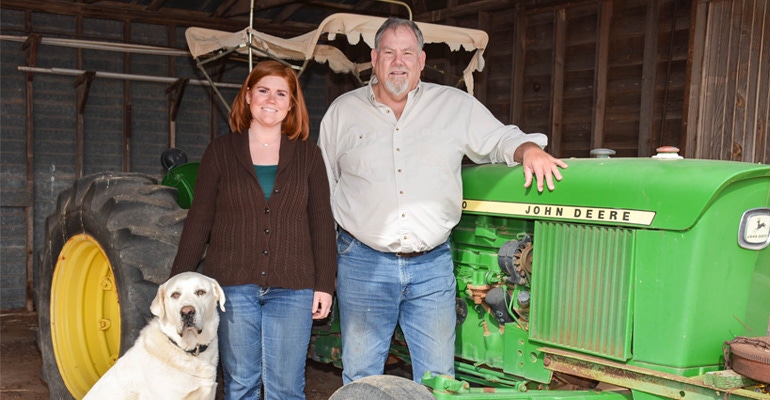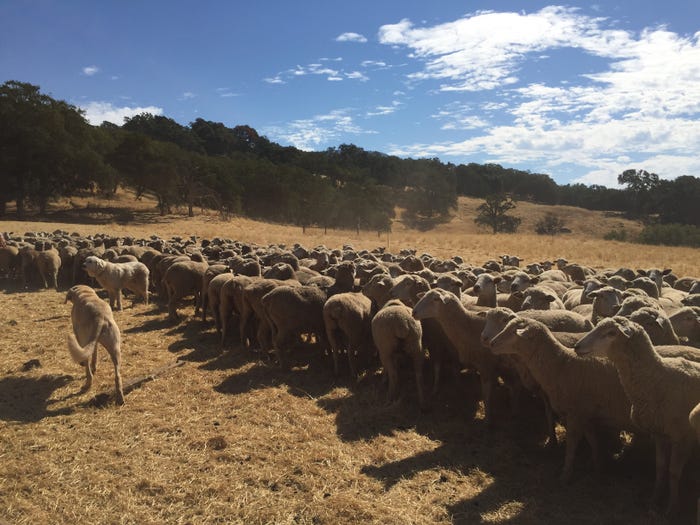
Former ag teacher becomes student of her family farm
“Agriculture is life. We can’t live without it, so growing up in it I always knew I would remain involved. For my brother and sister as well, for all three of us, it was a no-brainer to go into agriculture in some capacity. I can’t imagine doing anything different.”

Author and columnist Marjorie Holmes wrote, “At Christmas, all roads lead home.” But for former ag teacher Katy Sutton, all roads have led back to her family’s cotton farm in Lubbock County, Texas.
“My dad had a spot open up on the farm and I’d always wanted to come back so I took the opportunity,” says Sutton. “I left teaching and I’ve been home farming — this last year was my first full season.”
The oldest of three siblings, Sutton was the first to be enlisted by her daddy to work on the farm. “At an early age, I learned to drive a truck so I could help move equipment and I also learned to drive a tractor,” she says. “As a kid, I always had a role at harvest time running the module builder and I’ve always really enjoyed it.”
Sutton graduated from high school loving farming but aspiring to be a veterinarian. While she received a bachelor’s degree in Animal Science from Texas A&M University, upon graduation she went a different direction, working at a large commercial pig farm, then a bull stud and lastly in crop insurance. “Then I decided to go back and get a master’s degree at Texas Tech University in agriculture education,” says the multi-generational farmer. “That’s when I got my teaching certificate and taught ag in high school for five years. I’ve worked several different jobs, all in various parts of agriculture— coming back to the farm is one of my favorites so far.
“Agriculture is life. We can’t live without it, so growing up in it I always knew I would remain involved. For my brother and sister as well, for all three of us, it was a no-brainer to go into agriculture in some capacity. I can’t imagine doing anything different.

Katy Sutton and father Freddy Harkey visit while she tends to her sheep. Oklahoma to host Women in Agriculture and Small Business Conference, Aug. 9-10, at Oklahoma City.
Farm-her
While Sutton returned to the family farm with her husband, he’s keeping his city job while she farms alongside her dad Freddy Harkey. Since she’s returned she says she’s done a little bit of everything from running the rod weeder during planting season, the boll buggy and module builder during harvest and assisting with paperwork and making financial decisions alongside her father. “Right now I am more like an employee, but we are working on building a partnership,” she says. “We talk about decisions, but he makes the final decisions. I am increasingly taking on a bigger role in that.”
Part of that role is taking care of the technological side of the operation. “When I started he showed me the GPS system on the tractor and said you need to be the expert on this.” But it’s his years of experience on which she relies. “I definitely will rely a lot on his expertise. He’s been doing this his whole life; he knows his fields well.”
The father-daughter duo has a 10-year plan for Sutton to take over one farm per year. “I’m thrilled,” says Sutton’s dad. “My father taught me how to farm and now I’m teaching her how to farm and to take over. “It’s a generational thing— we go back to the Carolina’s, several generations, cotton famers.
“She’s always enjoyed farming and agriculture, so I think it’s great to pass it down to future generations, especially a daughter. That doesn’t happen too much and she’s very good at it.”
Soil Health
This month Sutton attended the No-Till Texas Symposium in Lubbock, Texas, at the Bayer Museum of Agriculture to learn more about no-till, cover crops and water and soil conservation. “As I step into more important roles on the farm I really want to focus on building up the operation for the future,” she says. “We’ve traditionally been cotton farmers and I would love to continue cotton, it’s my heritage.”
But she says she would also like to diversify. “I would like to see a little bit of livestock, maybe do some cover-cropping, some rotational grazing in the future. I’m really interested in raising pastured lamb meat,” Sutton says. “I really enjoy raising sheep. I’ve raised a small flock of sheep for the last few years and would like to expand that and incorporate it to our cotton operation.”
Change in focus
When Sutton reflects on changes in agriculture, she says the biggest change she’s seen is a change in focus, “how we grow our food and our fiber. We talk about how people are several generations removed from the farm and a lot of people don’t have any connection to their food or their fiber. I think we’re seeing a shift in that, certainly with the younger generations.”
Another change she’s witnessed is something she’s proud to be a part of and that’s more women in farming. But farming isn’t the first time she’s been in the minority. “Ag teaching is traditionally a male job, but there were quite a few females teaching when I began to teach who paved the way there,” she says. “Farming in this area, there are not a lot of females. Most of the farmers have known me since I was a kid, and so I don’t think any of them are surprised to see me come back to the farm.”
As Sutton and her father begin the 2018 season with hopes of growing cotton again, the La Niña weather pattern has her concerned. “We’re looking at a drought year — there’s some hope that it could lift later in the year and get us some rain, but it’s going to be one of those years where conservation and using technology are going to be very important.”
About the Author(s)
You May Also Like





